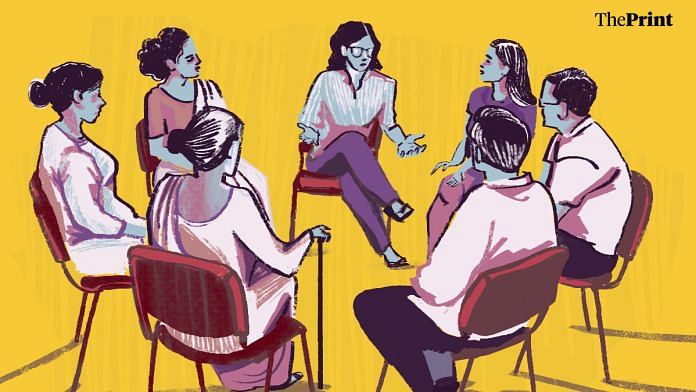New Delhi: Babita Deshmukh’s – name changed – adult child is finally coming back home, but she’s terrified. A few months ago, he was diagnosed with schizophrenia, and now, days before he’s ready to leave the centre where he is being treated, she’s in a panic. She’s relying on her support group of mental health caregivers to guide her. “Everyone is saying that you have to be strong. I want to be prepared for this,” she says. “I am new to this role as a caregiver.”
The people on her Zoom screen nod sympathetically. There is no judgement or censure as Deshmukh discusses the overwhelming fear and guilt that’s riding her emotions. This support group for caregivers of mental health patients meet about once a month. Its members are mainly women from all over India – Maharashtra, Himachal Pradesh to Delhi — mothers, daughters, sisters, and wives who are intimately aware of the mental, emotional and even physical exhaustion that comes with taking care of loved ones battling depression, schizophrenia, OCD, and other disorders.
“Whatever you are feeling is okay. The key is to accept that this is something you have to do,” a member tells Deshmukh as the others nod.
The Covid-19 pandemic has given an impetus to conversations around mental health in India. But in a country where 90 per cent of psychiatric patients live with their families, caregivers are still largely ignored. There is an invisibility to them, and now they are demanding to be heard. They are formalising themselves, building online and offline support groups, and working with mental health experts.
It’s only the beginning of a long fight to be heard and accepted not just by society, but by the medical community and the law.
“We will have to change the law and give rights to the caregivers to make things better,” says Dr Om Prakash, professor – psychiatry, and senior consultant – adult and geriatric psychiatry, at the Institute of Human Behaviour and Allied Sciences.
But first, it’s about building awareness among caregivers themselves.
“The most common feeling that caregivers have is the burden of guilt. They don’t like to talk about their problems because they feel it’s the patient who needs attention and they don’t want to focus on themselves,” says Noida-based holistic trauma therapist Akanksha Chandele.
Deshmukh attends sessions organised by the Swayam Foundation, which offers affordable therapy, counselling and support to caregivers of persons with mental illnesses (PMI). The support groups here offer more than tea and sympathy. In this Zoom session, Deshmukh is learning how to watch out for signs and ‘red flags’ like hyperactivity or lethargy and loss of appetite or irritability.
“You will have to know the red flags. Every mental illness has one. If your loved one is sleeping too much then you should consult the doctor. You catch the flag when it is yellow, before it turns red,” says another caregiver from the group as Deshmukh listens attentively. She’s slowly coming to terms with the changes in her life.
“What we get as caregivers is pity. People tell us, ‘You are such a strong person’. But we are not strong people by choice. These support groups are for us to be shattered, to be vulnerable, to break down, to not to be strong all the time,” says Ghaziabad-based Shrinkhla Sahai, the director of Swayam Foundation.
The most common feeling that caregivers have is the burden of guilt. They don’t like to talk about their problems because they feel it’s the patient who needs attention and they don’t want to focus on themselves
– Akanksha Chandele, holistic trauma therapist
Love is not enough
Sahai had no support group to turn to when her “loved one” was diagnosed with bipolar disorder 10 years ago. Everyone around her simply assumed that she would keep the household going.
“I know how frustrating and draining it is to be a caregiver. I used to call my friends and tell them that I think my loved one hates me. But we have to keep reminding ourselves that this is not the person talking, it is the disease,” says Sahai. “But when I shared my stress with my family and friends, they did not understand.”
And while she did seek the help of a therapist, the lack of a formalised support system was like a wound that refused to scab. She started reading books about it and researched online, and soon decided to get a master’s degree in clinical psychology. In 2018, she founded the Swayam Foundation, where she is its executive director and lead psychologist.
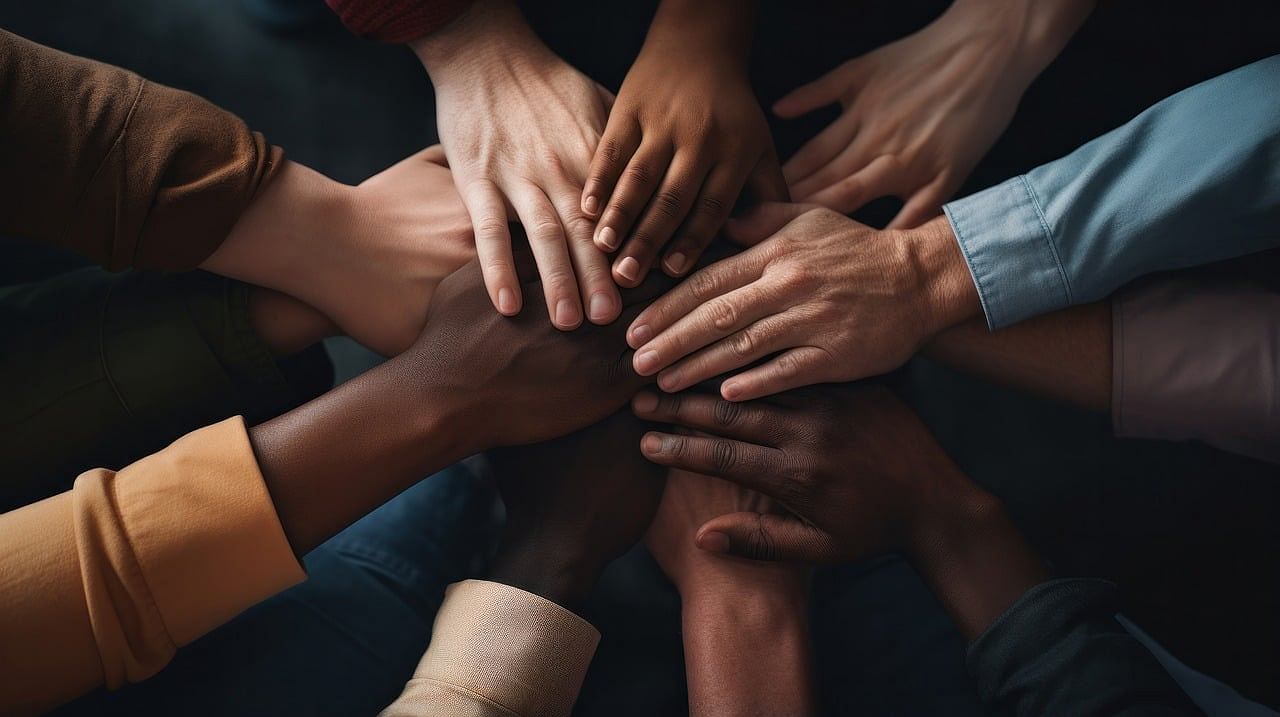
The platform offers courses, information for caregivers, legal advocacy as well as training programmes. In March this year, Sahai, who is also pursuing a PhD in psychology, won an award for ‘Best Facilitation of Support Groups’ at the Women and Mental Health Summit 2024. Through the platform, she has built a community of caregivers who are learning to prioritise themselves.
“In my whole career, I have only received two to three caregivers who came to me for therapy on their own,” says Chandele, who is also the founder of ‘I Am Wellbeing’, which has centres in Noida and Delhi
“My psychiatrist helped me differentiate between the illness and the person. A caregiver really needs this knowledge to make their and the patient’s life better,” says Sahai.
This is something that Sahai and the Swayam Foundation prioritise while equipping caregivers with the knowledge and tools to deal with patients. These support groups provide one-on-one training sessions to guide members on how to cope with different situations—if a patient, for instance, suddenly refuses to take their medication, or locks themself up in a room. More often than not, family members are not trained to handle difficult situations like a psychotic episode or a manic phase.
“My psychiatrist helped me differentiate between the illness and the person. A caregiver really needs this knowledge to make their and the patient’s life better,” says Sahai. She pauses and then adds: “Love is important but not enough to take care of a person with mental illness.”
Also read: What brings joy to India’s elderly? There’s more to them than RWA, bhajans, ashrams
The caregiver burden
Sakshi Sharma’s husband, who was diagnosed with bipolar disorder in 2007, takes all his daily medication–except for one tablet. He simply refuses to take it. For the 17 years that she’s been taking care of him, Sharma, 40, has been mixing the tablet in his food.
The initial years after her husband’s diagnosis were the toughest time of her life. “My in-laws refused to take any responsibility,” says Sharma, a teacher from Himachal Pradesh’s Dharamshala who attends Swayam Foundation’s support group meetings regularly. It became her responsibility to take care of her husband and her newborn baby.
My psychiatrist helped me differentiate between the illness and the person. A caregiver really needs this knowledge to make their and the patient’s life better
– Shrinkhla Sahai, director, Swayam Foundation
“My husband got beaten by his relatives because he ran away from the hospital. Everyone left but I stayed to take care of him. Now, at least people are talking about it. There is talk about mental health awareness,” she adds.
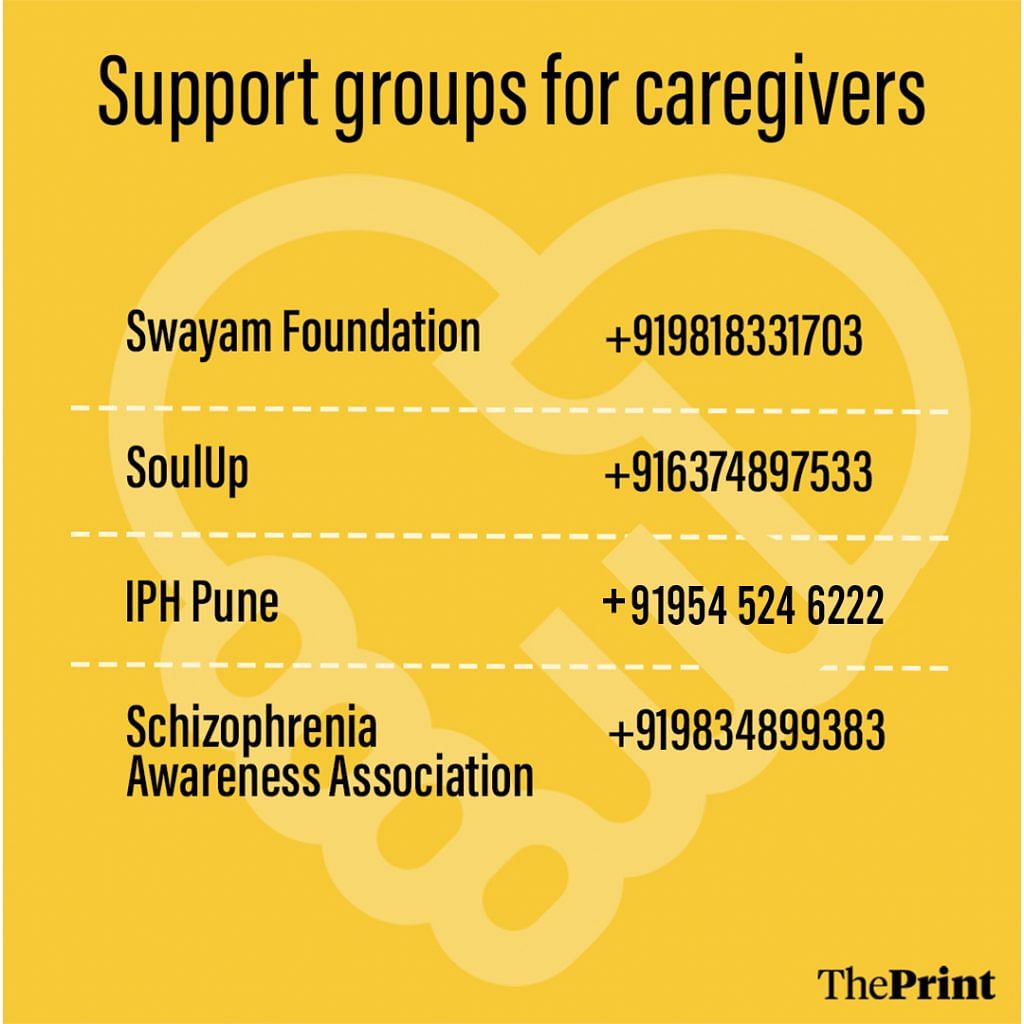
Cajoling her husband to see the doctor, giving him his medication and simply taking care of him—that’s her life. Her relatives would taunt her because she became the breadwinner and head of the family.
“People used to say that I gave medicine to my husband so he could sleep. They blamed me [for his condition]. They would make fun of me because I had to become the ‘man of my family,” says Sharma, whose son is now 15 years old.
In India, the burden of caregiving is higher for spouses, according to a study published in the Journal of Neurosciences in Rural Practice a few years ago. For their research, the authors used the Burden Assessment Schedule and Brief Cope Scale to conclude that the odds of severe burden increased 4.77 times for spouses compared to siblings.
“Providing care for more than five years increased the odds of severe burden to 2.37 times as compared to those who provided care for 1–2 years,” they wrote.
Sharma’s constant worry is who will take care of her family when she dies.
It’s what drives Pune-based caregiver Amrit Bakhshy’s legal advocacy. At 82, he’s knocking on the doors of lawyers and courts to secure the future of his daughter, who was diagnosed with schizophrenia in 1990. As India embarked on a new liberalisation journey and opened its doors to other countries, Bakhshy was trying to make sense of his new reality. In those days, nobody was talking about mental health—it was still a taboo topic.
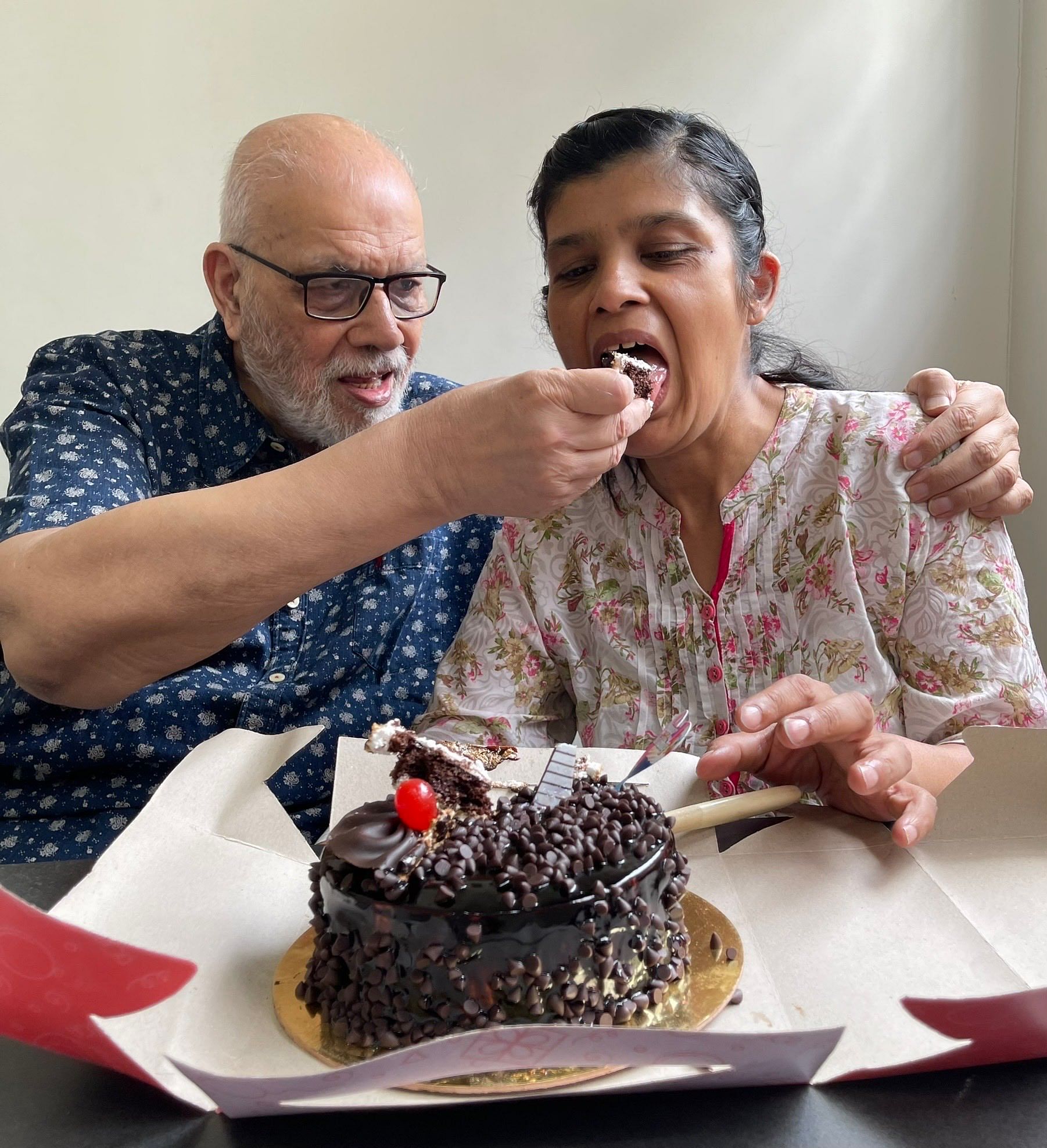
“It was very difficult in the 1990s. There were no support groups. I formed one back then, but it was not sustainable. My wife and I were always afraid that our daughter could jump or harm herself,” says Bakhshy, who used to work as a banker.
Mental health consumes his every waking moment. He’s written a book for caregivers. He manages a WhatsApp group for caregivers with hundreds of members. He is president of the Schizophrenia Awareness Association, served on the institutional board of the National Institute of Mental Health and Neuro Sciences (NIMHANS), and was appointed by the government to the expert group to draft rules and regulations of the Mental Healthcare Act 2017.
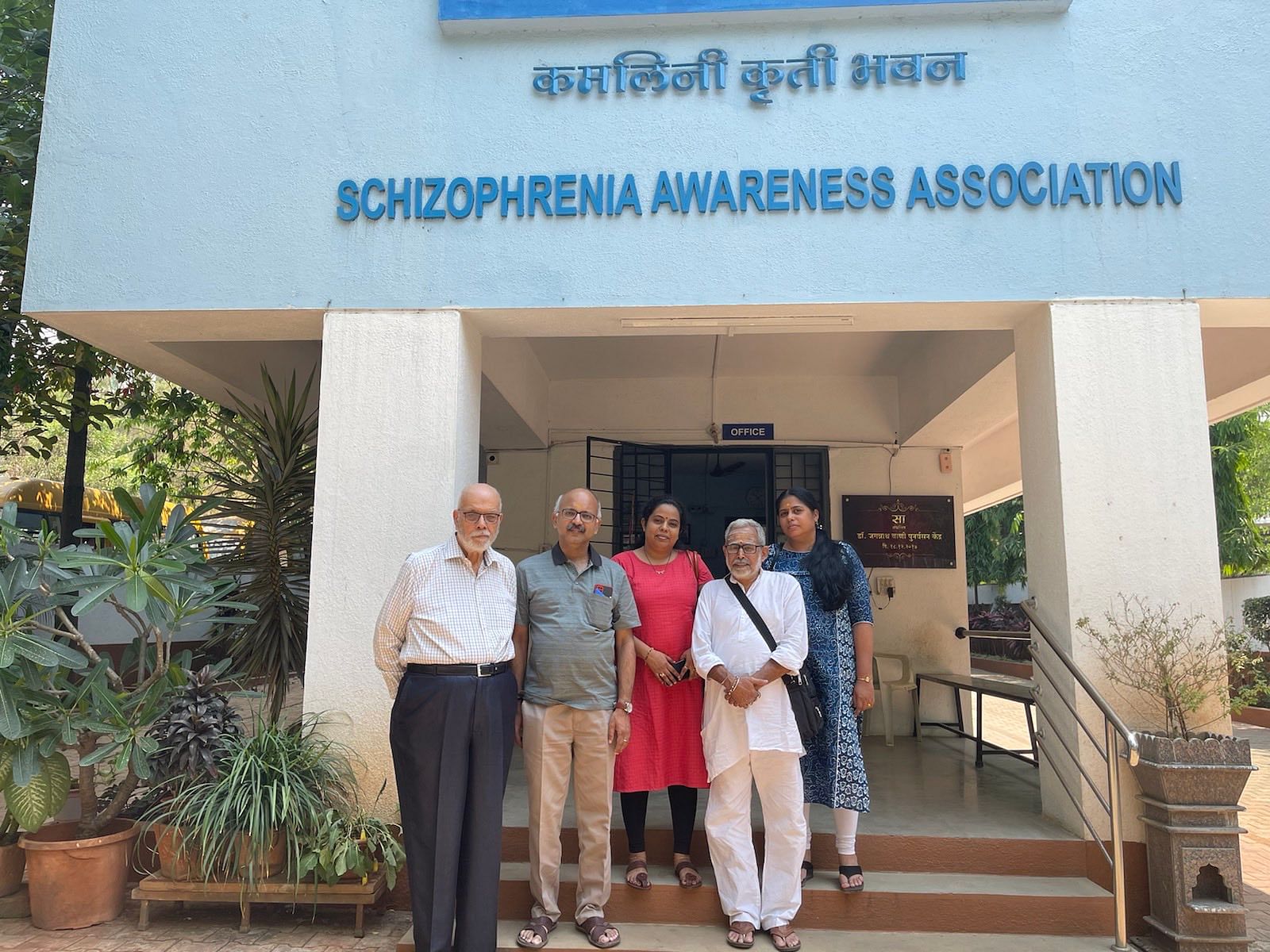
“My daughter used to throw knives at me and I used to put pillows around me so I could save myself. We had to hide the knives. I left my job after saving the money to care for her,” says Bakhshy. In the initial years, his wife left her job in the hospitality sector to take care of their daughter. She died of cancer four years ago, but by then Bakhshy had quit his job as well, and the family had relocated from Mumbai to Pune.
Like Sharma and Sahai, Bakhshy is very aware of the toll caregiving takes on the mental health of family members. In a study published in the Indian Journal of Psychiatry, the authors attempted to compare the caregiver burden in psychiatric and chronic medical illnesses. They found that caregivers of mental health patients are at risk of depression, anxiety and burnout. “Community-based studies proved that 18–47% of caregivers end up in depression,” the authors wrote. The study included two groups with 50 members—one comprising those taking care of psychiatric patients and the other of caregivers of chronic medical illness patients.
“The caregiver burden scores in the caregivers of psychiatric patients were significantly higher than that of chronic medical illness,” they concluded. What’s more, the researchers found that the burden increased with the duration of illness as well as with the age of the caregiver.
It’s what happened to Sakshi Sharma. “It was so tough and overwhelming that I went into depression. But it took me a lot of effort to pull myself out of that stage,” she says.
Also read: Live-in couples in small town India have it rough – Varanasi to Vadodara, Aligarh to Alwar
Safe spaces
Every ping in Sahai’s WhatsApp group with 80 members is invariably a desperate cry for help.
“I feel like walking away, I feel horrible but I wish this person will die,” writes one caregiver.
Another member just wants to talk to somebody who understands what she’s going through: “My loved one is not taking medicine, refusing to go to the hospital.”
Online and offline groups offer caregivers a safe space to vent their frustrations, share their experiences, and seek advice. There need to be more such spaces, say therapists.
It was very difficult in the 1990s. There were no support groups. I formed one back then, but it was not sustainable. My wife and I were always afraid that our daughter could jump or harm herself
– Amrit Bakhshy, full-time caregiver and SAA president
Having grown up in a small town in Haryana taking care of his mother who was diagnosed with severe depression, Mohit Sharma, 27, had no idea that such groups even existed—until recently. When he moved to Delhi to study, he found himself reaching out to anyone who needed help. He invested time taking care of two people battling mental disorders and was unable to distance himself. It was only when he started suffering from depression that he sought professional help.
A support group would have helped him identify these behavioural patterns in time.
“I developed this natural instinct in me that if I saw someone struggling with mental illness, I felt it was my responsibility to help them and while doing that, I completely ignored my mental health,” says Mohit.
He’s back in Haryana, where he freelances as a content writer while taking care of his mother.
But it is very difficult to find support groups and even harder to sustain them—because people don’t show up. They don’t think that their problems are real. They always prioritise the sick person over their own needs.
At Swayam Foundation, Sakshi Sharma never misses a caregiver support group session. And now that she is a ‘senior member’, she sometimes moderates sessions too. She shares tips on handling loved ones’ manic and depressive episodes, and administering medicines if patients refuse to take them. She advises other caregivers to pay attention to detail—from medicines and food habits to mood changes.
“My husband used to run in the streets and I used to run after him. I handled the manic stages and now I know the signs before an episode occurs,” says Sharma. The support group was not a panacea, but it allowed her to talk about the darker side of being a caregiver.
“In the beginning, I used to listen. I got to know people who are in worse situations than me. I learned emotional regulation,” says Sharma. Most importantly, she learned that just because caregiving is such a huge part of her life, she doesn’t have to stop living.
Another caregiver, who doesn’t wish to be named, shared her guilt of being unable to support her mentally ill brother. She works at a multinational company and hasn’t had much time to devote to him. Her parents take care of him for the most part. But she knows there will come a time when she will have to look after him full-time—the dread, fear and worry that consumes her are often followed by crippling feelings of guilt and shame.
“Sometimes dealing with the outside world becomes so much that I have no patience left for this. I feel guilty, but I keep supporting my family financially,” she says.
A lot of other caregivers respond immediately. “You have empathy and that is enough for you right now. Whenever the time comes for you, you will do a good job and we are here to support you,” says an experienced caregiver.
Also read: Last emails, long tea breaks, garden strolls—a day in the Maulana Azad Education Foundation
No policy for caregivers
The Mental Healthcare Act says that a patient can’t be forced to get admitted to a hospital and that they have the right to refuse treatment (except in severe cases). However, the Act remains silent on what the caregiver should do in such cases.
Over the last decade, India has made huge strides in dragging mental health into mainstream conversations. It’s now part of HR policies in the corporate sector, and under the Mental Healthcare Act, the Insurance Regulatory and Development Authority of India (IRDAI) has even made it compulsory for insurance companies to include mental health coverage. But everything—the National Mental Health Programme and the decentralised District Mental Health Programme—tends to zoom in on the patient.
The caregiver has been forgotten.
“Presently the Mental Healthcare Act does not say anything or give anything or any right to the caregiver. We need to add caregivers to the policy,” says Dr Om Prakash.
There are days when Bakhshy is flabbergasted by the lack of awareness. After his death, he wants a friend to become his daughter’s guardian. But doing this has been quite an uphill task because the law, court and even the lawyers are clueless about mental illness and the Act.
“I have to explain the technicalities and the Act to the lawyers,” says Bakhshy, frustration leaking into his voice.
Activists, doctors, counsellors and others in the mental health community are increasingly calling for a relook at the 2017 Act to include caregivers. But first, “qualitative studies are required from the family’s perspective to illustrate the hindrances” they face, warn the authors of a paper, Family matters! – The caregivers’ perspective of Mental Healthcare Act 2017’ that was published in the Indian Journal of Psychiatry.
Presently the Mental Healthcare Act does not say anything or give anything or any right to the caregiver. We need to add caregivers to the policy
– Dr Om Prakash.
“In the context of Indian family structure and dynamics and working in the Indian community, we feel that without suitable amendments to include the family’s concerns, the present Act would stand as an alien Western law enforced on Indian cohesive family dynamics,” the authors wrote.
Many of the caregivers and mental health activists ThePrint spoke to want a separate Act for themselves–one that will offer financial support, helplines and counselling services tailored to their needs; incentives to NGOs who specialise in this area, and an acknowledgement of an ageing population. Bakhshy suggested that a caregiver system be developed along the lines of countries like Canada and the United Kingdom. These countries have a well-oiled ecosystem of paid caregivers and have specific schemes for them.
“My daughter fell on the floor but I couldn’t lift her. I had to call my maid and her family to lift her and then we took her to the hospital. I am 82 years old, there are many things I can’t do,” said Bakhshy. He would like to see more community centres and greater availability of generic medicines.
“These things don’t help the caregivers directly but even if they benefit the patient, it would be a big help for the caregivers,” he added.
During the 2019 Lok Sabha elections, Bakhshy, with the help of an organisation, reached out to political parties to add ‘implementation of the Mental Healthcare Act’ to their manifesto. “Only two parties agreed.”
(Edited by Zoya Bhatti)


